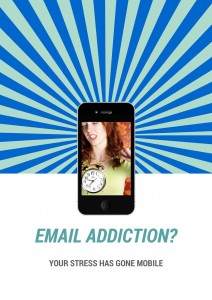 I’d ask you to raise your hand if you’re addicted to work email but I imagine that many of you have your hands full with mobile devices, about to check your email. Smart phones and tablets give us the ability to remotely monitor our inboxes after hours.
I’d ask you to raise your hand if you’re addicted to work email but I imagine that many of you have your hands full with mobile devices, about to check your email. Smart phones and tablets give us the ability to remotely monitor our inboxes after hours.
Sounds like a victory for productivity and in a lot of ways it is. We don’t have to be tethered to a desk anymore. But as you might guess, there is a dark side: We spend a lot of hours off the clock, checking our messages.
A new Gallop survey looked at stress and the use of mobile technology. It found that while respondents love the chance to do their jobs out of the office, those who check their emails after hours are more likely to experience a substantial amount of stress on any given day than workers who do not exhibit these behaviors.
While the study raises some good points, the reality is that mobile devices aren’t going away anytime soon, nor is the compulsion to check work emails. And while it’s easy to understand that working more for the same amount of money hurts you, there’s also a feeling that being seen as on top of work issues is equally valuable.
Here are some suggestions for how to balance the need to stay connected with the need to stay sane:
Catching Up or Falling Behind
There can be a lot of minor emails that can be answered with one sentence. Answering these while watching TV can give you a feeling of control over your inbox. The trick is to make sure your catch up time is set amount of time, at a certain time of the day.
So at 7:30 p.m., you spend roughly 15 minutes reviewing and answering your email. Then you stop. This is catching up.
The trap is checking your inbox every 30 minutes. This comes out of a fear of falling behind. You become the overwhelmed assembly worker who’s trying to keep up with a fast moving conveyor belt. No wonder people are experiencing higher levels of stress.
Draft But Do Not Respond
If the subject of an email is more complex or might involve a contentious discussion, draft a response but don’t send it. After a good night’s sleep, you can review your message and make sure it has the right tone.
Complex issues are best discussed in person and if you send an immediate response, you may receive an immediate reply, which may make you feel like sending another message.
Embrace Brevity
Ernest Hemingway once won a bet after he said that he could write a short story in only six words. His output: For sale. Baby shoes. Never worn. is a wonderful reminder about the power of words.
Can you give a similar treatment to your emails? Get to the point and then move to the next message. If you feel that you need to type out a novel, why not respond by saying, “This is a complex issue that’s hard to summarize in an email. Can we talk about it tomorrow?”
You may feel you need to explain every detail. That may not be what the other person wants.
Maybe you can have some fun with brevity in the office. Create a fun, traveling trophy that goes to the employee who can convey the most information in the fewest number of words.
In my book, Stuck on Yellow: Stop Stalling, Get Serious, and Unleash Your Productivity, I talk about some of the other time challenges that leaders often face. You might enjoy Chapter G: Gulp or Shot Glass Sized Problems.






